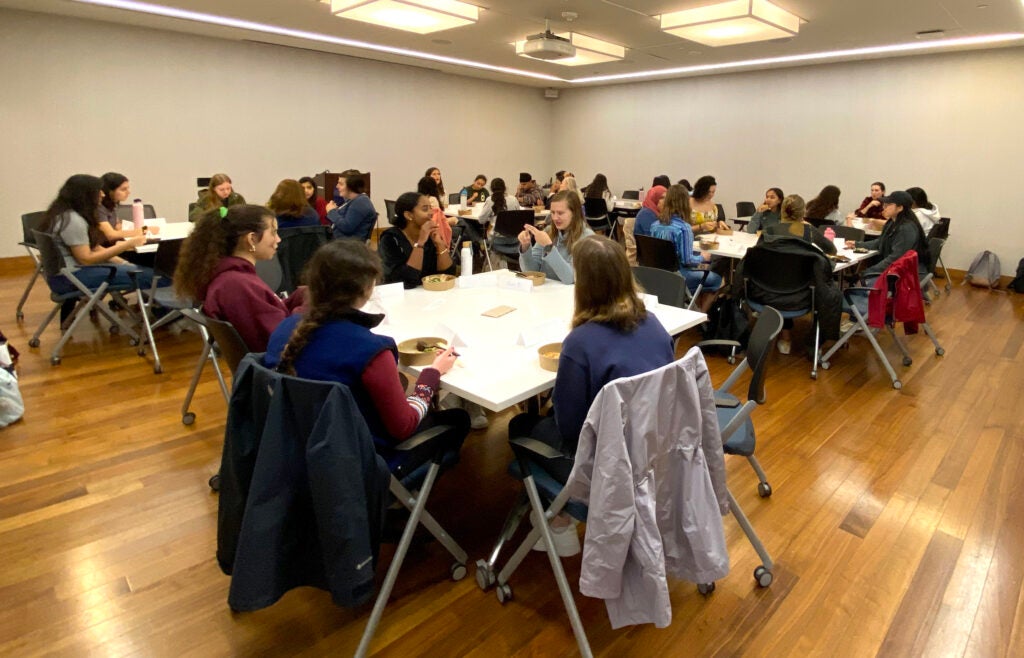Sharing More than a Meal
How an Interfaith Dinner Set the Stage for New Perspectives and New Friendships
By Bridgitte Isom (H’24)

Undergraduate women meet over dinner to talk about faith, friendship & the challenges of living out their faith as busy college students.
This month, Catholic Women at Georgetown hosted an interfaith dinner that provided female students an opportunity to learn how their peers practice their faith at Georgetown. Living out one’s faith at college can be challenging because of the many demands on students’ time, and as organizer, I and my team were hoping to learn how women from other faith traditions approach this challenge. We also hoped that new, meaningful friendships would come from the experience.
In the days leading up to the dinner, we were excited to gather such a diverse group of women together. Members of the Jewish, Protestant, Muslim, Hindu, Buddhist, Sikh, and Catholic organizations had reserved a seat, and as eager as we were to make their acquaintance, we were also a little nervous. Would our conversations venture into serious theological and philosophical topics that are difficult to agree upon? How would we strike a balance between creating a casual dinner setting and encouraging conversation about religion?
As the first guests arrived, we quickly realized that all would be well. Everyone was smiling, laughing, and talking as they served themselves and found their seat at a table. It was heartwarming to observe their immediate willingness to introduce themselves to someone new and share a meal with them. As I began conversing with Iman Saymeh, a Muslim residential minister, and students from the Latter Day Saints Student Association (LDSSA), my feelings of excitement evolved into those of curiosity, inspiration, and a sense of shared experience. The women were eager to speak honestly about their faith, particularly in the context of living at Georgetown. We realized that we face a common struggle of not always knowing how to share our faith with other students because of common assumptions or misconceptions associated with our religion. Most important to me was our agreement that faith is a central part of who we are and requires an investment of time to continue its cultivation throughout college. I was particularly inspired when I learned that the LDSSA members travel to Chevy Chase, Maryland, every Sunday for a two-hour worship service.
I was also touched by the profound messages our female chaplains and resident ministers shared at the end of the dinner. They each spoke about the importance of interfaith work, encouraging us to appreciate the beauty found in all faith traditions, celebrate commonalities, and respect differences. Most importantly, they emphasized that cultivating spirituality is a communal effort that can be carried out across religious groups. No one person can grow in faith through isolation.
Before this event, interfaith work felt a bit daunting. I had attended interfaith retreats to learn how this work is carried out, but had never done so in practice. Organizing the dinner has shown me how fruitful it can be to learn from students who have different beliefs, and I now have the confidence to continue similar interfaith collaboration. Even more meaningful than this, however, was the deepening of my friendship with one student from LDSSA. She asked to attend Catholic Mass with me the next day, to which I readily agreed. It was very special to share my faith with her in a tangible way and showed us that our worship services have much in common. This is the type of friendship I hoped to encourage through the interfaith dinner, a friendship that appreciates the value of religious experience and motivates each person to live out their faith to the fullest.
*Student reflections are edited for space and clarity.